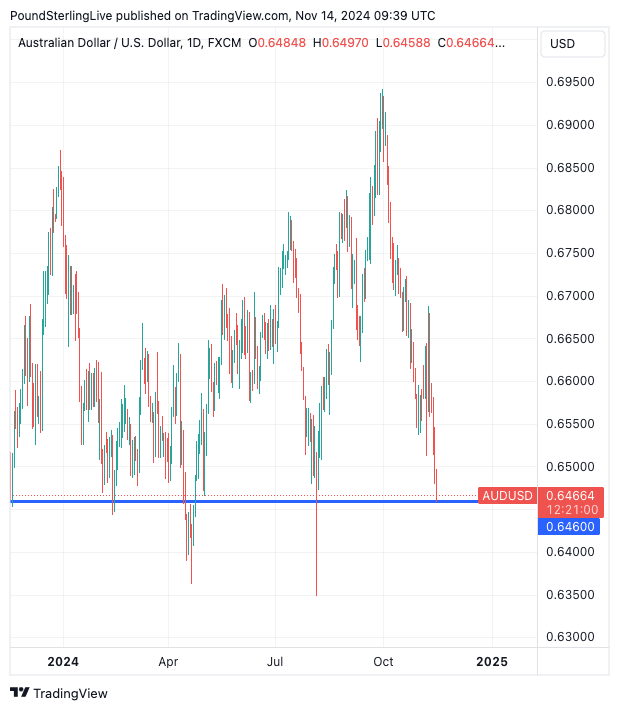
Image © Adobe Images
The Australian Dollar has broken below a key level amidst the ongoing Trump realignment on global markets and soft domestic data.
The Aussie has lost value to all its G10 peers over the course of the past week amidst expectations that Trump means tougher times for China and global trade, to which Australia is sensitive.
Domestically, Australia added 16K new jobs in October said the ABS, which was less than the market's expectation for 25K, and down on the previous month's 61.3K.
"AUD/USD broke below support of 0.6490 (23.6% fibbo) and is currently trading near 0.6460. The next support can be found at the 5 August low of 0.6350," says Carol Kong, Economist and Currency Strategist at Commonwealth Bank of Australia.
The disappointing jobs data won't have helped AUD sentiment at a time of broadening global pressures. However, a closer inspection of the numbers would suggest it is too soon to sell AUD on domestic developments alone.
"Despite the slowdown, the level at which the labour market is operating remains very robust," says Volkmar Baur, FX Analyst at Commerzbank. "The three-month average is still above 40,000 new jobs. And unemployment, at 4.1%, remains well below pre-pandemic levels."
The robust nature of the data meant the market's expectations for the start of the Reserve Bank of Australia's rate cutting cycle is largely unchanged, with the first cut expected towards mid-2025.
Above: AUD at key support.
This late start to the cutting cycle, amidst a sea of central banks that are already well along the path to lower rates, marks interest rate policy as a key source of support for the Aussie Dollar.
Risks to the currency would include the first rate cut coming sooner, something Baur sees as possible.
"In my view, the risk is therefore more towards an earlier economic slowdown and a faster rate cut. The AUD should therefore tend to weaken in the coming months," he says.
The clear headwind to Australia's economy would be a significant disruption in global trade that hurts its key partners, such as China, that results from U.S. tariffs.
Donald Trump's agenda has been bolstered by news the Republicans won the House of Representatives midweek, confirming the 'red sweep'.
Trump has signalled he is wasting no time and has made some significant appointments that signal to markets he will follow through with his agenda of raising tariffs on U.S. imports, with China expected to bear the brunt of the tax.
"Concerns over trade issues between Washington and Beijing are likely to keep the AUD on offer as well," says Roberto Mialich, FX Strategist at UniCredit Bank.
"Finally, the move in AUD is starting to make a little sense. While the AUDUSD is still above the lows seen last Wednesday and provided that you were able to navigate the 2.7% rally, at least it is heading in the direction that one would have expected post-Trump election victory," says a note from JP Morgan's FX trading desk.

